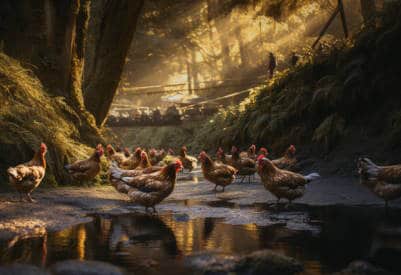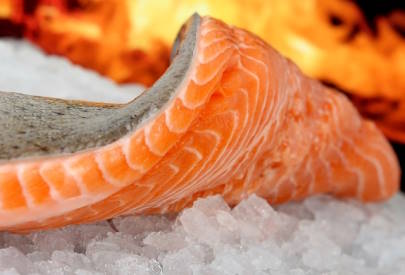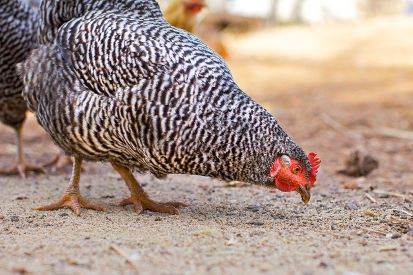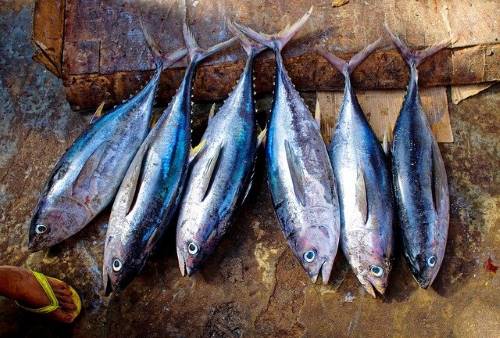As a backyard chicken owner and enthusiast, I often wonder about the diverse foods my feathered friends can safely consume. One such question that crossed my mind recently was, can chickens eat salmon? As it turns out, the answer isn’t as straightforward as you might think.
Yes, chickens can eat salmon. But there’s a lot more to this answer than just a simple affirmative. Just like humans, chickens require a balanced diet for optimal health, and while salmon can be a beneficial addition to their menu, it comes with certain precautions.
This article will dive deeper into chicken nutrition, the potential benefits and risks of feeding salmon to chickens, and some practical advice for those who introduce this protein-rich fish to their chickens’ diet. If you’re curious about expanding your flock’s menu with a taste of the sea, you’ve come to the right place.
Understanding Chicken Nutrition
Nutrition plays a critical role in the overall health and productivity of chickens. To lay nutritious eggs and maintain their feathers in tip-top shape, chickens require a balanced diet, and knowing what to feed them is key.
Nutritional Requirements for Chickens
Chickens require a variety of nutrients in their diet, including protein, carbohydrates, fats, vitamins, and minerals. Protein is essential for growth, feather formation, and egg production. Carbohydrates and fats provide the energy needed for daily activities, while vitamins and minerals are crucial for maintaining overall health.
The Role of Protein in a Chicken’s Diet
Protein is a powerhouse nutrient for chickens. It aids muscle development, supports healthy egg production, and is critical for young chicks’ growth. Chickens can source protein from various foods, including grains, legumes, and animal products.
[ChickenAffiliate]
Overview of Salmon as a Food Source
Salmon is a highly nutritious food source known for its omega-3 fatty acids, high-quality protein, and wealth of vitamins and minerals.
Nutritional Value of Salmon
Salmon is rich in Omega-3 fatty acids, which benefit heart health. It’s also a fantastic source of lean protein and essential vitamins and minerals, including vitamin D, B, selenium, and iodine.
The Benefits of Salmon for Human Consumption
The high concentration of Omega-3 fatty acids in salmon supports heart health, reduces inflammation, and aids brain function. Its protein content supports muscle maintenance and repair, while the various vitamins and minerals contribute to overall health and wellbeing.
Can Chickens Eat Salmon?
You might be wondering whether our feathered friends can enjoy these nutritional benefits of salmon. Can they safely peck at this fishy feast?
Unpacking the Controversy: Can Chickens Eat Fish?
The idea of feeding chickens fish, including salmon, is somewhat controversial among poultry keepers. Chickens are omnivorous creatures and can technically eat a wide variety of foods, including fish. However, some poultry owners argue that the strong fish flavors can pass into the eggs, affecting their taste.
Potential Benefits of Salmon for Chickens
From a nutritional perspective, cooked salmon can be a beneficial addition to a chicken’s diet. The high protein content in salmon can aid in egg production and feather health, while its omega-3 fatty acids could potentially contribute to their overall wellbeing.
Precautions When Feeding Salmon to Chickens
Although salmon has potential benefits for chickens, certain precautions must be taken to ensure their safety and health.
Ensuring the Salmon Is Cooked
Raw salmon may contain parasites or harmful bacteria that could make your chickens sick. To mitigate this risk, always cook salmon thoroughly before offering it to your flock.
Why Raw Salmon Can Be Harmful to Chickens
The risk of raw salmon harboring parasites or disease-causing bacteria is real. These potential pathogens could negatively affect a chicken’s health, causing illness or death. Therefore, it’s always safer to feed your chickens cooked salmon.
Toxicity Concerns
When feeding salmon to your chickens, ensure it is free from any preservatives, artificial flavors, or additives that could harm them. Many processed salmon products may contain these harmful substances, so it’s best to use fresh or plainly cooked salmon.
How to Safely Introduce Salmon to a Chicken’s Diet
If you’ve decided to introduce salmon to your chicken’s diet, you should follow a few steps to ensure this is done safely.
Preparing Salmon for Chickens
Firstly, thoroughly cook the salmon, ensuring there are no raw parts. Break it up into small, manageable pieces for the chickens. Remember, salmon should be a treat or supplement, not a replacement for a balanced chicken feed. Feed your chickens salmon sparingly, perhaps once a week, to avoid potential issues.
Monitoring for Allergic Reactions or Adverse Effects
After introducing salmon, monitor your chickens closely for any adverse effects. While it’s rare, some chickens may have an allergic reaction to fish. Signs of discomfort, behavior changes, or egg production could indicate a problem.
Alternatives to Salmon If It Doesn’t Agree with Your Chicken
If your chicken doesn’t take to salmon, you can offer other high-protein alternatives. Mealworms, for example, are a chicken favorite and are packed with protein.
Experiences and Case Studies
Finally, let’s look at some experiences and case studies to gain insights into the benefits and potential downsides of feeding salmon to chickens.
Case Study: Chickens on a Diet Including Salmon
Consider a small flock owner who started offering cooked salmon to her chickens once a week. She reported increased feather vibrancy, and although not scientifically measured, she believed her chickens seemed more active and content.
Feedback from Poultry Keepers
In various poultry forums, some keepers report positive experiences when feeding their chickens salmon, highlighting improved feather and egg health. However, others voice concerns over the potential alteration of the taste of eggs and the risk of introducing allergens.
Expert Opinions on Feeding Salmon to Chickens
Veterinarians and poultry experts agree that chickens can safely consume cooked salmon, provided it’s fed sparingly and as part of a balanced diet. They caution against replacing regular feed with salmon and recommend closely monitoring chickens after introducing any new food item to their diet.
What Other Seafood Can Chickens Eat?
While salmon might be on the menu for your chickens, you might wonder if other types of seafood are safe for them. Can chickens enjoy a variety of seafood treats? Let’s find out as we explore the safety and benefits of shrimp, fish, tuna, and minnows for our feathered friends.
Shrimp
Shrimp can indeed be a tasty treat for chickens. Packed with protein and low in fat, these tiny crustaceans can provide a nutritional boost. However, as with salmon, they should be cooked thoroughly to kill any potential pathogens, and any hard shells should be removed to prevent choking hazards.
Read More: Can Chickens Eat Shrimp? Exploring Seafood Delights
Fish
Fish, in general, can be a good source of protein for chickens. Again, cooking is essential to kill off any potential parasites. Remember, strong-smelling fish may impart an unwanted flavor to your chicken’s eggs, so opt for milder varieties if this is a concern.
Read More: Can Chickens Eat Fish? Uncover The Surprising Benefits
Tuna
Tuna is another type of fish that chickens can safely eat. It’s high in protein and other beneficial nutrients. However, due to its high mercury content, it’s best to feed tuna to your chickens only occasionally. Always choose plain tuna with no added flavors or preservatives.
Read More: Can Chickens Eat Tuna? Unveiling The Truth And Risks
Minnows
Minnows are small fish that can be a fun and nutritious treat for chickens. They are usually safe for chickens to eat, especially if they’ve been farmed for feeding pets. If you’re sourcing minnows from a natural body of water, it’s best to cook them first to kill parasites. Be sure to serve them in a way that’s easy for your chickens to peck at and consume.
Read More: Can Chickens Eat Minnows? 5 Great Benefits
FAQs About Chickens Eating Salmon
How does salmon compare to other types of seafood regarding nutritional value for chickens?
Salmon is a great source of protein, omega-3 fatty acids, and various vitamins and minerals, making it a beneficial supplement to a chicken’s diet. However, like all foods, it should be part of a balanced diet. Other seafood options like shrimp, other fish types, and even minnows can also provide valuable nutrients.
Is it environmentally sustainable to feed salmon to chickens?
Feeding salmon to chickens could contribute to overfishing and other environmental concerns associated with large-scale fishing operations. If you choose to feed salmon to your chickens, try to source it responsibly, and remember, it should be a supplemental treat, not a dietary staple.
Are there specific chicken breeds that are more likely to enjoy or benefit from salmon in their diet?
No specific research suggests that certain chicken breeds prefer or benefit more from salmon than others. Chickens, in general, are omnivorous and can consume various foods.
Is it cost-effective to feed salmon to my chickens?
Feeding salmon to chickens can be pricier than traditional chicken feed or other protein supplements like mealworms. It’s best to consider salmon an occasional treat rather than a regular diet to keep feeding costs manageable.
Can chickens eat salmon – final thoughts
Yes, our feathery friends can enjoy the nutritional perks of salmon, but remember, moderation and preparation are key. Like any treat, salmon should be given sparingly, in small, manageable pieces, and always cooked to safeguard against potential parasites and diseases.
By understanding our chickens’ nutritional needs and cautiously introducing new foods, we can ensure their diets are both diverse and balanced. So, give them a taste of the sea, and watch as your flock clucks with delight. After all, happy chickens lay the tastiest eggs!





